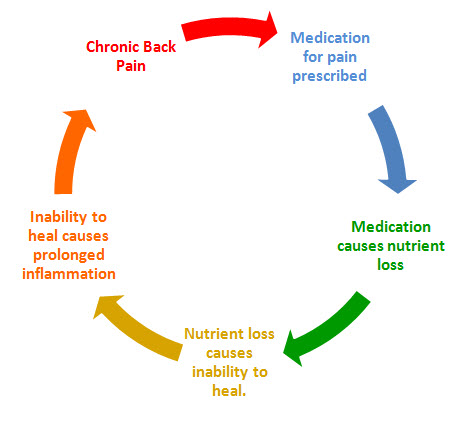Back pain is the second most common condition that people visit their doctor for. Likewise, prescriptions medications to treat pain are often the first line o treatment recommended by doctors. Unfortunately, pain medications do little to address the actual origin of the pain and serve more to mask the outward symptoms. The consequences of long term pain medications on healing and nutritional status are discussed in this Web Wellness University video below…
Prescription Drugs for Pain Don’t Solve the Problem
Drugs only mask inflammation, they do not correct the source. Many pain meds also cause vitamin and mineral deficiencies. This side effect can prevent long term healing. For example, NSAIDS (non steroidal anti-inflammatory drugs) can cause folic acid and vitamin C deficiency. Both of these vitamins are crucial for the body to be able to repair damaged cartilage, joints, tendons, and ligaments. See the diagram below:
Most, doctors specializing in the treatment of arthritis, joint pain, back pain, neck pain, and other diseases affecting the musculoskeletal system never even consider diet as an important factor in the development of these conditions. I was formally trained in rheumatology at the VA hospital in Houston, TX, and I can say that diet and nutritional recommendations to patients were discouraged and in most cases frowned upon by our attending physicians. It was actually this experience that prompted me to dig deeper into the connection between join/muscle diseases and food.
Over the past 10 years, I have treated thousands of patients with arthritic conditions. The most single effective therapies have always been diet and exercise. The paradox with exercise… It is harder to stick to if it flares up the arthritis. The problem with food…everyone reacts uniquely based on their own unique chemistry. But it only makes sense that if drugs can target inflammation as a treatment, why can’t food. After all, isn’t food a drug of sorts?
I have found that medical research greatly supports this connection, but more importantly, I have found that patients get better after eliminating inflammatory foods from their diets. What foods should we avoid to help recover from arthritis? Depends on the person. Everyone is unique.
Problems That Benefit With The Right Diet Changes:
- Osteoarthritis
- Muscle spasms
- Stiff man’s syndrome
- Degenerative disc disease, disc herniations
- Sprain/Strains
- Tennis and Golfer’s Elbow
- Chronic Repetitive Injuries
- Rheumatoid arthritis
- Lupus
- spondyloarthritis
- psoriatic
- reactive arthritis
- Fibromyalgia
- Scleroderma
- Myofascitis
- Dermatomyositis
If you suffer with a chronic pain condition and have been using medications with little benefit, try finding a functional medicine doctor.
Wishing you excellent health,
Dr. Osborne
Dr. Osborne is an expert in functional medicine and chiropractic care. He is Board Certified in Nutritional Medicine. You can contact his office at 281-240-2229. He regularly treats patients from across the world. His office is in Sugar Land, Texas in the Greater Houston area.










